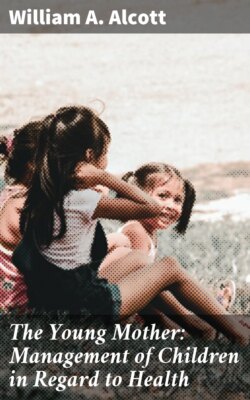Читать книгу The Young Mother: Management of Children in Regard to Health - William A. Alcott - Страница 8
TEMPERATURE.
ОглавлениеGeneral principle—"Keep cool." Our own sensations not always to be trusted. Thermometer. Why infants require more external heat than adults. Means of warmth. Air heated in other apartments. Clothes taking fire. Stove—railing around it. Excess of heat—its dangers.
There is one general principle, on this subject, which is alike applicable to all persons and circumstances. It is, to keep a little too cool, rather than in the slightest degree too warm. In other words, the lowest temperature which is compatible with comfort, is, in all cases, best adapted to health; and a slight degree of coldness, provided it amount not to a chill, and is not long continued, is more safe than the smallest unnecessary degree of warmth.
But the application of this rule to those over whom we have control, is not without its difficulties. Our own sensations are so variable, independently of external and obvious causes, that we cannot at all times judge for others, especially for infants. The absolute and real state of temperature in a room can only be ascertained by the aid of a thermometer; and no nursery should ever be without one. It should be placed, however, in such a situation as to indicate the real temperature of the atmosphere, and not where it will give a false result.
No mother should forget that the infant, at birth, has not the power of generating heat, internally, to the extent which it possesses afterward. The lungs have as yet but a feeble, inefficient action. The purification of the blood, through their agency, is not only incomplete, but the heat evolved is as yet inconsiderable. In the absence of internal heat, then, there is an increased demand externally. If 60° be deemed suitable for most other persons, the new-born infant may, for a few days, require 65° or even 70°.
Much may and should be done in preserving the child in a proper temperature by means of its clothing. On this point I shall speak at length, in another part of this work. My present purpose is simply to treat of the temperature of the nursery.
The best way of warming a nursery—or indeed any other room, where MERE warmth is demanded—is by means of air heated in other apartments, and admitted through openings in the floor or fire-place. The air is not only thus made more pure, but every possibility of accidents, such as having the clothes take fire, is precluded. This last consideration is one of very great importance, and I hope will not be much longer overlooked in infantile education.
Next to that, in point of usefulness and safety, is a stove, placed near or IN the fire-place, and defended by an iron railing. Most people prefer an open stove; and on some accounts it is indeed preferable, especially where it is desirable to burn coal. Still I think that the direct rays of the heat, and the glare of light from open stoves and fire-places, particularly for the young, form a very serious objection to their use.
One of the strongest objections to open stoves and fire-places in the nursery is, the increased exposure to accidents. I know it is said that this evil may be avoided by laying aside the use of cotton, and wearing nothing but worsted or flannel. This is indeed true; but I do not like the idea of being compelled to dress children in flannel or worsted, at all times when the least particle of fire is demanded; for this would be to wear this stimulating kind of clothing, in our climate, the greater part of the year.
Besides, I write for many mothers who are compelled to use cotton, on account of the expense of flannel. And if the stove be a close one, and well defended by a railing, cotton will seldom expose to danger. Still, as has been already said, the introduction of heated air from another apartment, whenever it can possibly be afforded, is incomparably better than either stoves or fire-places.
Dr. Dewees is fully persuaded that the excessive heat of nurseries has occasioned a great mortality among very young children. "In the first place," he says, "it over-stimulates them; and in the second, it renders them so susceptible of cold, that any draught of cold air endangers their lives. They are in a constant perspiration, which is frequently checked by an exposure to even an atmosphere of moderate temperature." If this is but to repeat what has been already said, the importance of the subject seems to be a sufficient apology.
